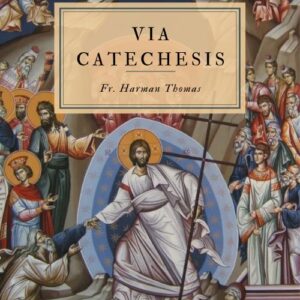
Why Do We Need Catechesis?
At the conclusion of his earthly ministry, Jesus commissioned his disciples to “Go and make disciples of all nations, baptizing them in the name of the Father and of the Son and of the Holy Spirit, and teaching them to obey everything I have commanded you” (Matt. 28:19-20). With the resurgence of missionary zeal in the 19th and 20th centuries, the first call of Christ’s Great Commission has been pursued zealously. The second—teaching them to obey everything I have commanded you—has proven more elusive for the modern church. In his epistle to the Galatians, Paul assumes this level of instruction as he writes, “Let the one who is taught the word share all good things with the one who teaches” (Gal. 6:6). Can the same be assumed of our churches today?
Catechesis (instruction) was marrow in the bones of the early Church. By the end of the first century, the Church had produced its first catechism: The Didache, or the teachings of the twelve apostles. So important was catechesis to the earliest Christians that new believers were required to undergo three years of instruction before being received into the Church through Holy Baptism. This pattern of catechesis continued through the era of the Apostolic Fathers, persisting through persecution, threat, and division in the Church. Additional material was added to the catechetical corpus with the composition of the Nicene Creed, and ecumenical councils further defined the boundaries of orthodoxy as heresies emerged. By the fourth century, Church Fathers were composing catechetical literature of their own. Saints Gregory of Nyssa, Cyril of Jerusalem, and Augustine of Hippo all wrote manuals for teaching their parishes that centered on four central points: 1) telling the story of Scripture from Creation to Redemption, 2) exhorting believers in the Apostles’ Creed, 3) teaching them to pray the Lord’s Prayer, and 4) encouraging them to pattern their lives after the Ten Commandments.
At CCA, we believe that catechesis is central to our life in Christ and our growth as disciples. For this purpose, we have crafted a two-class series that ensures that every person who pursues membership at Christ Church receives robust, relational, formational catechesis in the Christian faith.
 The first part of this series is Fr. Chase’s First Steps class, which begins Sunday, September 3 in Room 4. In First Steps, we emphasize the relational component of catechesis. Many of our new members come from faith backgrounds and are versed in Scripture and the key tenets of Christian doctrine. First Steps can serve as an introduction to the Christian faith for a new believer, but it is also designed to welcome lifelong Christians into the family of Christ Church. Newcomers will hear Fr. Chase clearly articulate the timeless truths of the Gospel, highlighting at the outset that the Gospel of Jesus Christ is the central and foundational reality upon which all else at Christ Church is built. Then—and only then—can we begin to discuss the specific ways we live out the Gospel as Anglicans. In the second half of First Steps, Fr. Chase will unpack how worship in the Anglican way—from our liturgy to our vestments to our architecture—points us to Jesus Christ, to whom we ascribe all glory, laud, and honor forever.
The first part of this series is Fr. Chase’s First Steps class, which begins Sunday, September 3 in Room 4. In First Steps, we emphasize the relational component of catechesis. Many of our new members come from faith backgrounds and are versed in Scripture and the key tenets of Christian doctrine. First Steps can serve as an introduction to the Christian faith for a new believer, but it is also designed to welcome lifelong Christians into the family of Christ Church. Newcomers will hear Fr. Chase clearly articulate the timeless truths of the Gospel, highlighting at the outset that the Gospel of Jesus Christ is the central and foundational reality upon which all else at Christ Church is built. Then—and only then—can we begin to discuss the specific ways we live out the Gospel as Anglicans. In the second half of First Steps, Fr. Chase will unpack how worship in the Anglican way—from our liturgy to our vestments to our architecture—points us to Jesus Christ, to whom we ascribe all glory, laud, and honor forever.
The second part of this two-class series is Via Catechesis, where we emphasize the robust and formational components of catechesis. When I first encountered Via Catechesis at our Diocesan Synod in 2021, I was immediately compelled by the fact that the curriculum mirrors the order of the Fathers’ catechetical manuals mentioned above. But Via is no stodgy, tedious approach to catechesis. Fr. Harman Thomas, Via’s author and a priest in the Diocese of Western Anglicans, wrote Via with this adage in mind: Every pedagogy has an implicit anthropology, and every anthropology has an implicit theology. Underneath those five-buck words is this truth: the way we teach reveals what we think about humans. And the way we  think about humans reveals something about what we think about God. In Via, the pedagogy (teaching) breaks from the traditional model of the teacher standing behind the lectern delivering lectures. Instead, the pedagogy revolves around an anthropology (understanding of humans) that prizes the image of God in each participant, recognizing him or her as a royal priest in God’s Kingdom. Rather than a lecture, the realities of the faith are communicated in a dialogue—a conversation about Scripture, the catechism, and a relevant icon or piece of artwork.
think about humans reveals something about what we think about God. In Via, the pedagogy (teaching) breaks from the traditional model of the teacher standing behind the lectern delivering lectures. Instead, the pedagogy revolves around an anthropology (understanding of humans) that prizes the image of God in each participant, recognizing him or her as a royal priest in God’s Kingdom. Rather than a lecture, the realities of the faith are communicated in a dialogue—a conversation about Scripture, the catechism, and a relevant icon or piece of artwork.
In Via Catechesis, I work alongside a co-facilitator (Sarah Thomas) to invite parishioners to look at themselves and their lives through the lens of the Gospel—the big-R Reality that our Creator God sent his Son, Jesus, to establish His Kingdom ‘on earth as it is in heaven,’ conquering sin and death through his own death and resurrection, and sending forth the Holy Spirit to continue building God’s Kingdom through Christ’s Bride, the Church. Like St. Cyril and St. Gregory, we examine the creeds, the Lord’s Prayer, and the Ten Commandments as clear and ancient expressions of our faith and promises of our hope in Christ. Via concludes with a look at how we can live out that faith and hope in the Anglican Way, observing the life of prayer, liturgy, Scripture-reading, and sacramental rites included in the Book of Common Prayer.
This fall, we are excited for the beginning of First Steps and Via on Sunday, September 3. If you are waiting for First Steps to start, are interested in membership, or would simply like to deeply consider your faith in the company of the faithful, join Sarah Thomas and me this Sunday, August 27, 2023, in Room 7 at 9:15 AM for a Via Catechesis Interest Meeting. We would love to share more with you about why Via Catechesis has captured our hearts. In the meantime, check out this video for more information.
Grace and Peace,
Deacon Bree Snow

